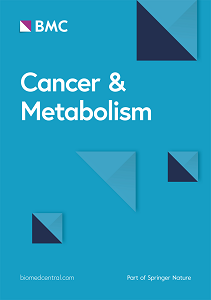Association between diabetes mellitus and reduced efficacy of pembrolizumab in non-small cell lung cancer.
IF 5.3
3区 医学
Q1 CELL BIOLOGY
引用次数: 2
Abstract
BACKGROUND Diabetes mellitus (DM) is a highly prevalent chronic metabolic disorder. Although DM has been associated with immune dysfunction, the effect of DM on the efficacy of immunotherapy is unknown. This study aimed to evaluate the impact of DM on the efficacy of pembrolizumab in metastatic non-small cell lung cancer (NSCLC). METHODS The authors reviewed the medical records of consecutive metastatic NSCLC patients treated with first-line pembrolizumab either alone or in combination with chemotherapy at a single tertiary center. For validation, a computerized data from Maccabi Healthcare Services, a 2.5-million-member state health service was used. RESULTS Of the 203 eligible patients, 51 (25%) had DM. Patients with DM had a significantly shorter median progression-free survival (PFS) (5.9 vs. 7.1 months, p = .004) and overall survival (OS) (12 vs. 21 months, p = .006). The shorter OS in diabetic patients was more pronounced when pembrolizumab was given alone (12 vs. 27 months, p = .03) than when combined with chemotherapy (14.3 vs. 19.4 months, p = .06). Multivariate analysis confirmed DM as an independent risk factor for shorter PFS (hazard ratio [HR], 1.67; 95% confidence interval [CI], 1.11-2.50, p = .01) and OS (HR, 1.73; 95% CI, 1.09-2.76, p = .02). In a validation cohort of 452 metastatic NSCLC patients, the time on pembrolizumab treatment was shorter in diabetic patients (p = .025), with only 19.6% of patients remaining on treatment at 12 months compared to 31.7% of the nondiabetic patients. CONCLUSIONS This study suggests immunotherapy is less beneficial in diabetic NSCLC patients. More work is needed to verify our findings and explore similar effects in other cancer entities.糖尿病与派姆单抗治疗非小细胞肺癌疗效降低的关系
背景:糖尿病(DM)是一种非常普遍的慢性代谢疾病。虽然糖尿病与免疫功能障碍有关,但糖尿病对免疫治疗效果的影响尚不清楚。本研究旨在评估DM对派姆单抗治疗转移性非小细胞肺癌(NSCLC)疗效的影响。方法:作者回顾了连续转移性NSCLC患者在单一三级中心接受一线派姆单抗单独或联合化疗的医疗记录。为了验证,使用了马卡比医疗服务公司的计算机数据,这是一个拥有250万成员的州医疗服务机构。结果203例符合条件的患者中,51例(25%)患有糖尿病。糖尿病患者的中位无进展生存期(PFS)(5.9个月对7.1个月,p = 0.004)和总生存期(OS)(12个月对21个月,p = 0.006)显著缩短。糖尿病患者单独使用派姆单抗时(12个月vs. 27个月,p = 0.03)比联合化疗时(14.3个月vs. 19.4个月,p = 0.06)的生存期更短。多因素分析证实糖尿病是缩短PFS的独立危险因素(风险比[HR], 1.67;95%置信区间[CI], 1.11-2.50, p = 0.01)和OS (HR, 1.73;95% CI, 1.09-2.76, p = 0.02)。在452例转移性NSCLC患者的验证队列中,糖尿病患者接受派姆单抗治疗的时间更短(p = 0.025),只有19.6%的患者在12个月后仍在接受治疗,而非糖尿病患者的这一比例为31.7%。结论本研究提示免疫治疗对糖尿病非小细胞肺癌患者的疗效较差。需要更多的工作来验证我们的发现,并探索其他癌症实体的类似影响。
本文章由计算机程序翻译,如有差异,请以英文原文为准。
求助全文
约1分钟内获得全文
求助全文
来源期刊

Cancer & Metabolism
Multiple-
自引率
1.70%
发文量
17
审稿时长
14 weeks
期刊介绍:
Cancer & Metabolism welcomes studies on all aspects of the relationship between cancer and metabolism, including: -Molecular biology and genetics of cancer metabolism -Whole-body metabolism, including diabetes and obesity, in relation to cancer -Metabolomics in relation to cancer; -Metabolism-based imaging -Preclinical and clinical studies of metabolism-related cancer therapies.
 求助内容:
求助内容: 应助结果提醒方式:
应助结果提醒方式:


